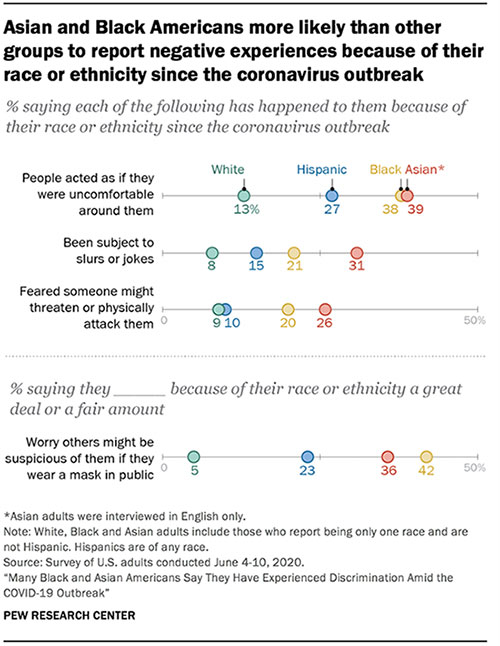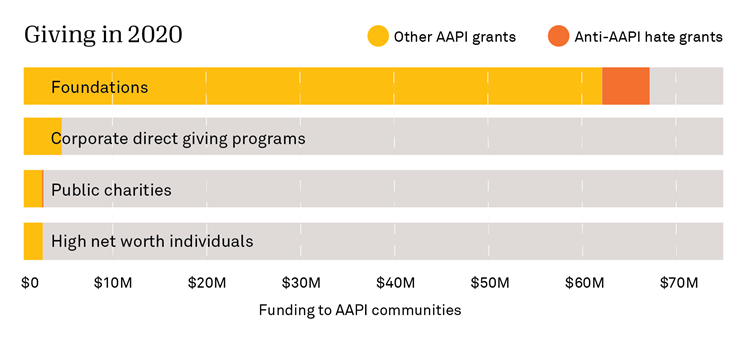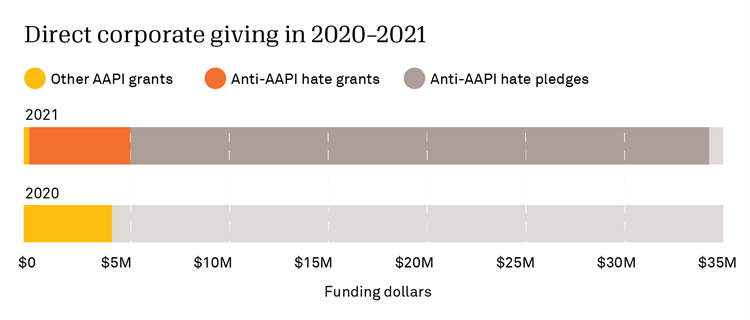The philanthropic response to the rise in Asian hate

On March 16, 2021, eight people were murdered in Atlanta. Six were Asian women: Soon Chung Park, Hyun Jung Grant, Suncha Kim, Yong Ae Yue, Xiaojie Tan, and Daoyou Feng. In the wake of their deaths, individuals, communities, and organizations have shown solidarity with words, actions, and millions of dollars pledged to end anti-Asian discrimination, violence, and hate. In this blog, I share what Candid’s data tells us about philanthropic trends for Asian American Pacific Islander (AAPI) communities in general and in reaction to recent anti-Asian hate crimes specifically as well as what to look for in the future.
The context of anti-Asian hate
Violence, hate, and discrimination against AAPI communities is a long-standing issue in the United States and has been building in recent years. As a Chinese American, I can attest that this hate is palpable. For example, in 2016, the sharp spike in anti-China rhetoric had me seriously wondering whether a concentration camp was in my future (given the U.S. history of interning Asian Americans). In early 2020, I briefly debated the pros and cons of Wearing-a-Mask-While-Asian. (Pros: decreased chance of getting COVID-19. Cons: a perceived increased risk of being a target of a hate-crime. Which is more deadly?) In April 2020, I listened, sick to my stomach, as my mother told me she was a victim of a COVID-related anti-Asian hate incident. Over the past year, my family text-chain has remained peppered with warnings and articles about the dangers of being Asian American today. These experiences are all too common.
 Between March 19, 2020, and February 28, 2021, the Stop AAPI Hate reporting center received accounts of 3,795 anti-Asian hate incidents ranging from verbal harassment to physical assault. There is reason to believe this number represents only a small fraction of the total hate incidents experienced by AAPI communities in the past year. A June 2020 survey by the Pew Research Center found that approximately one out of every three AAPI individuals surveyed reported having been subject to racial slurs/jokes since the beginning of the pandemic, and one out of four feared someone might threaten or physically attack them. Given there are approximately 22.6 million Asian Americans, it is not a stretch to predict that the actual number of anti-Asian hate incidents over the past year is well into the millions.
Between March 19, 2020, and February 28, 2021, the Stop AAPI Hate reporting center received accounts of 3,795 anti-Asian hate incidents ranging from verbal harassment to physical assault. There is reason to believe this number represents only a small fraction of the total hate incidents experienced by AAPI communities in the past year. A June 2020 survey by the Pew Research Center found that approximately one out of every three AAPI individuals surveyed reported having been subject to racial slurs/jokes since the beginning of the pandemic, and one out of four feared someone might threaten or physically attack them. Given there are approximately 22.6 million Asian Americans, it is not a stretch to predict that the actual number of anti-Asian hate incidents over the past year is well into the millions.
Foundation funding trends for AAPI communities
To interpret the current philanthropic response to anti-Asian hate, it is helpful to first understand philanthropic funding for AAPI communities over time. A recent analysis of Candid’s Foundation Maps data by Asian Americans/Pacific Islanders in Philanthropy (AAPIP) found that between 2014 and 2018, approximately 0.2 percent of annual funding explicitly focused on AAPI populations. In other words, “For every $100 awarded by foundations for work in the United States, only 20 cents explicitly supports AAPI communities.” AAPIP also found that total foundation funding for AAPI communities has effectively stayed under $200 million a year over the last decade (read AAPIP’s new report: Seeking to Soar: Foundation Funding for Asian American & Pacific Islander Communities).
These trends are disappointing but not surprising. Earlier AAPIP reports demonstrate that AAPI communities have received around 0.2 percent of foundation funding for decades. This number is consistent with research showing that the model minority myth has resulted in AAPI struggles being largely invisible and/or overlooked in the U.S.
Early figures for 2020 funding to AAPI communities
We do not yet have a comprehensive picture of funding in 2020,[i] however, we do have early numbers that some organizations have shared with us directly, along with data we’ve gathered via other methods. To date, we have recorded $75 million directed explicitly toward AAPI communities in 2020. The vast majority of these funds ($66.3 million) came from foundations.[ii] Additionally, $2 million came from high-net-worth individuals, $2 million was donated by public charities, and $4 million was donated via corporate direct giving programs (see bar graph below). Although it is important to reiterate that much of the funding for 2020 remains unknown, the high-level trends (e.g. overall amount, breakdown by funder type) so far do not seem too out of the ordinary compared to previous years.
Perhaps what is more notable is that—despite the rise in anti-Asian hate in 2020—only a fraction of the donations or pledges in our databases were denoted as focused on antidiscrimination or addressing issues of anti-Asian hate last year.[iii] Specifically, about 8 percent of foundation donations, 4 percent of public charity donations, and zero percent of corporate giving donations mentioned anti-Asian discrimination.

Corporate pledges in response to anti-Asian hate in 2021
The story so far in 2021 has been very different.
Candid’s data suggests corporate direct giving programs have already donated nearly $5 million in cash contributions to AAPI communities this year ($4,735,000). Twenty-eight percent ($1,315,000) of these donations were made through GoFundMe. Corporations have also pledged[iv] an additional nearly $30 million ($29,950,000). These donations and pledges total over $34 million promised ($34,685,000) to AAPI communities in the first few months of 2021 alone. This figure is more than eight times the direct corporate giving we have recorded to date for 2020 (see graph below). Moreover, in striking contrast to our data for 2020, 99 percent of 2021 corporate donations and pledges in support of AAPI communities and organizations were noted to be specifically in response to the rise in anti-Asian hate.

Additional trends in 2021
Our data also suggests that others have stepped up their donations to AAPI communities. Candid has recorded $179,000 donated and $10 million pledged to AAPI communities by public charities. Almost all these funds explicitly denoted a focus on anti-Asian hate and discrimination.
We have also recorded over a million dollars raised from high-net-worth individuals in 2021; and we estimate the total sum of individual giving to be even higher. A cursory glance at fundraisers on GoFundMe shows tens of thousands of individuals have donated small amounts to #StopAsian Hate, adding up to millions of additional dollars raised.
Finally, we do not yet have enough representative data to say whether foundation giving will also see a sharp increase in attention to AAPI communities this year. A few early pledges, however, suggest it is likely. Most notably, just last week the California Endowment pledged $100 million to nonprofits led by Asian Americans and Pacific Islanders to be paid out over the next 10 years, doubling their investment in AAPI communities.
Looking forward
How should we interpret these trends? My take reflects my thoughts about the moment more broadly. It feels like something has shifted in the last month when it comes to attention to and acknowledgement of discrimination against Asian Americans. That shift feels both belated and welcome, and I am both hopeful and wary. The reality is we do not have enough information to say whether this shift signals a long-term change or a momentary blip in support of AAPI communities. It also remains to be seen whether, when, and how corporations will make good on their pledges, and what foundation funding for the AAPI community will look like in 2021 (and 2020 for that matter). We will keep you posted as we learn more. In the meantime:
- To report an anti-Asian hate incident or to learn more about what you can do to help, visit stopaapihate.org.
- To obtain a guide on how to report hate crimes in California or New York written in Chinese, Japanese, Korean, Spanish, Thai, and/or Vietnamese, visit https://www.hatecrimebook.com/.
- To better understand the experiences of AAPI individuals facing anti-Asian hate during pandemic, read first-hand accounts at https://www.standagainsthatred.org/.
- To read Asian Americans/Pacific Islanders in Philanthropy’s recommendations on how philanthropy can increase support for AAPI communities, read Seeking to Soar.
- To further explore how philanthropy is responding, check out Candid’s Racial Equity map.
_______________
[i] Given that our data sets rely partly on IRS data, there is typically a two-year lag before we can offer a complete picture of all funding from a given year.
[ii] Foundations here include independent foundations, community foundations, and company-sponsored foundations.
[iii] To identify funding for AAPI communities, we searched our databases for U.S. grants/pledges coded with “People of Asian descent” as a recipient population, and the U.S. as the recipient location. To identify grants/pledges going to stop anti-Asian discrimination, violence, or hate, two researchers manually read through grant descriptions and recipients and coded instances that either 1) specifically mentioned anti-Asian discrimination, violence, or hate in the description or 2) were denoted for recipients explicitly focused on anti-Asian discrimination, violence, or hate (e.g., the Committee Against Anti-Asian Violence). We repeated this process for both 2020 and 2021 grants.
[iv] A pledge denotes that an organization has issued a public statement that it plans to donate a specific amount of money—it does not necessarily mean that the funds have already been donated.






